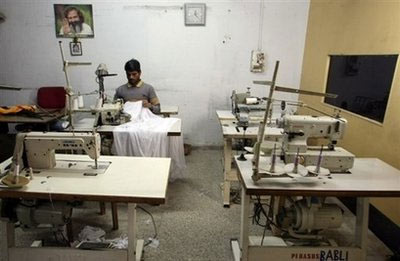Reuters
Mar 26, 2010
US promises greater market access to Pakistan
Reuters
Mar 26, 2010
By Sue Pleming
WASHINGTON (Reuters) - The Obama administration promised on Thursday 25 March to work for greater U.S. market access for Pakistani goods and said it would push Congress to take up stalled legislation that would offer some trade advantages.
 |
But any arrangement would fall far short of a free-trade agreement that Pakistan wants, with a senior U.S. official saying such a deal was not on the table.
After two days of talks aimed at improving often caustic ties between the two countries, a joint statement promised to look into U.S. market access, long a source of friction.
"The United States committed to work toward enhanced market access for Pakistani products as well as toward the early finalization of Reconstruction Opportunity Zones legislation," said the statement.
It gave no details which products could be affected. Pakistan has been pushing for lower tariffs on products such as textiles, arguing that greater market access should be a reward for the economic losses suffered as a result of the fight against militants.
Legislation to offer trade advantages in certain areas of Pakistan as well as Afghanistan has been stalled in Congress, slowed by feuding over labor standards and duty-free provisions in the legislation.
It was held up in the Senate because it was assigned to the same panel bogged down with healthcare reform, which has now been passed.
In an interview with Reuters, Pakistani Foreign Minister Shah Mehmood Qureshi said from his meetings on Capitol Hill this week, he was hopeful the bill would now be taken up.
PRIORITY LEGISLATION?
"Both sides are agreed that this should become priority legislation," said Qureshi.
A senior Obama administration official promised a concerted effort on the legislation. "We want to make a push on ROZ's," said the official.
The intended "opportunity zones" across Afghanistan and in Pakistan's border and tribal areas, where Taliban and al Qaeda militants have taken sanctuary, would produce some clothing and textile items for export to the United States duty-free.
Pakistan is already an exporter of these items and the idea is to create jobs that would lure people from poverty-stricken border areas where militants hire them with small amounts of money -- what some call the "Ten-dollar Taliban" --to fight.
Qureshi repeated that Pakistan would ultimately like a free trade agreement, which generally eliminates tariffs between countries and has separate chapters on issues such as services and intellectual property rights.
In the meantime, the plan was to come up with an interim arrangement that would increase investment. The two governments discussed creation of a fund to support increased foreign direct investment and development in Pakistan, particularly in the energy sector.
A senior U.S. official said the plan was to complete a Bilateral Investment Treaty (BIT) to stimulate investment in Pakistan but that a free-trade deal was not an option.
"Of course the Pakistanis would like it," said the official. "The waiting line is full," he said, referring to deals for Colombia and South Korea that are stuck in Congress.
A BIT would make investing in Pakistan more appealing as it usually safeguards companies against foreign expropriations and other government actions that could affect their investment in a particular country.
(Edited by Philip Barbara)
© Thomson Reuters 2024 All rights reserved.

























